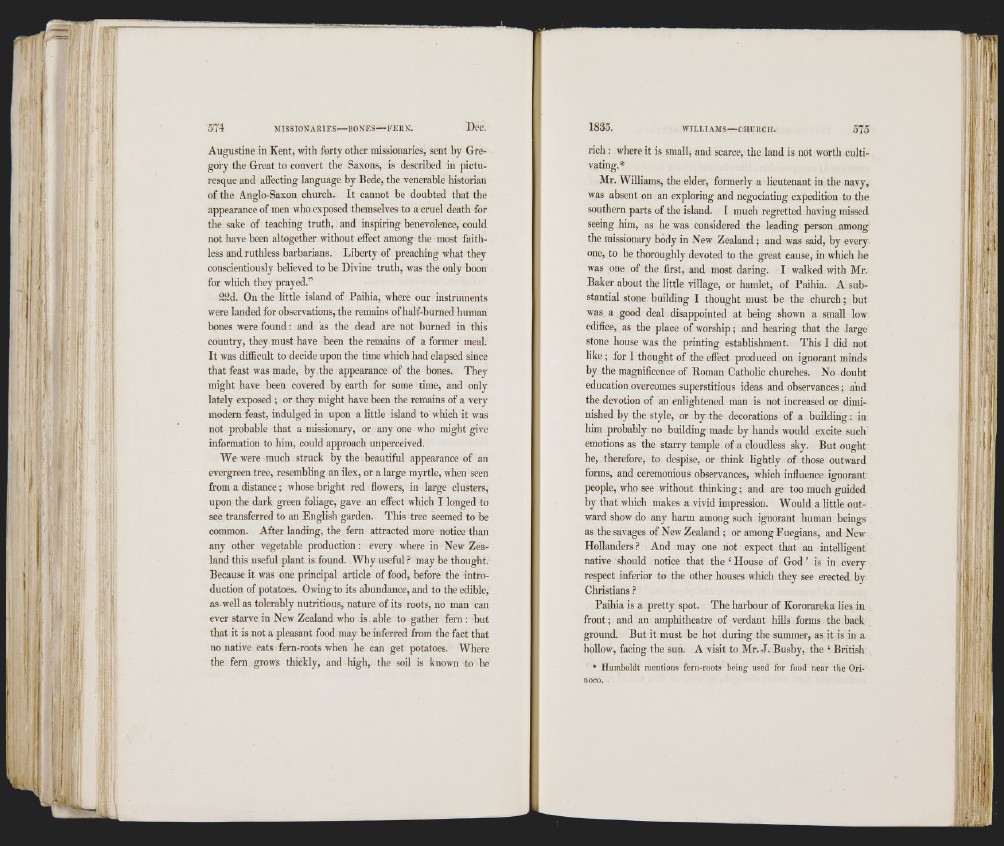
' i!,
I íl
V í H
i
EÍ57-.
574 MISSIONARIES BONES— FERNAugustine
in Kent, with forty other missionaries, sent by Gregory
the Great to convert the Saxons, is described in picturesque
and affecting language by Bede, the venerable historian
of the Anglo-Saxon church. It cannot be doubted that the
appearance of men who exposed themselves to a cruel death for
the sake of teaching truth, and inspiring benevolence, could
not have been altogether without effect among the most faithless
and ruthless barbarians. Liberty of preaching what they
conscientiously believed to be Divine truth, was the only boon
for which they prayed.”
22d. On the little island of Paihia, where our instruments
were landed for observations, the remains of half-burned human
bones were found: and as the dead are not burned in this
country, they must have been the remains of a former meal.
I t was difficult to decide upon the time which had elapsed since
that feast was made, by the appearance of the bones. They
might have been covered by earth for some time, and only
lately exposed ; or they might have been the remains of a very
modern feast, indulged in upon a little island to which it was
not probable that a missionary, or any one who might give
information to him, could approach unperceived.
We were much struck by the beautiful appearance of an
evergreen tree, resembling an ilex, or a large myrtle, when seen
from a distance; whose bright red flowers, in large clusters,
upon the dark green foliage, gave an effect which I longed to
see transferred to an English garden. This tree seemed to be
common. After landing, the fern attracted more notice than
any other vegetable production : every where in New Zealand
this useful plant is found. Why useful ? may be thought.
Because it was one principal article of food, before the introduction
of potatoes. Owing to its abundance, and to the edible,
as well as tolerably nutritious, nature of its roots, no man can
ever starve in New Zealand who is ahle to gather fern ; but
that it is not a pleasant food may be inferred from the fact that
no native eats fern-roots when he can get potatoes. Where
the fern grows thickly, and high, the soil is known to be
rich ; where it is small, and scarce, the land is not worth cultivating.*
Mr. Williams, the elder, formerly a lieutenant in the navy,
was absent on an exploring and negociating expedition to the
southern parts of the island. I much regretted having missed
seeing him, as he was considered the leading person among
the missionary body in New Zealand ; and was said, by every
one, to be thoroughly devoted to the great cause, in which he
was one of the first, and most daring. I walked with Mr.
Baker about the little village, or hamlet, of Paihia. A substantial
stone building I thought must be the church ; but
was a good deal disappointed at being shown a small low
edifice, as the place of worship; and hearing that the large
stone house was the printing establishment. This I did not
like; for I thought of the effect produced on ignorant minds
by the magnificence of Roman Catholic churches. No doubt
education overcomes superstitious ideas and observances; and
the devotion of an enlightened man is not increased or diminished
by the style, or by the decorations of a building: in
him probably no building made by hands would excite such
emotions as the starry temple of a cloudless sky. But ought
he, therefore, to despise, or think lightly of those outward
forms, and ceremonious observances, which influence ignorant
people, who see without thinking; and are too much guided
by that which makes a vivid impression. Would a little outward
show do any harm among such ignorant human beings
as the savages of New Zealand ; or among P uegians, and New
Hollanders.? And may one not expect that an intelligent
native should notice that the ‘ House of God ’ is in every
respect inferior to the other houses which they see erected by
Christians ?
Paihia is a pretty spot. The harbour of Kororareka lies in
front; and an amphitheatre of verdant hills forms the back
ground. But it must be hot during the summer, as it is in a
hollow, facing the sun. A visit to Mr. J. Busby, the ‘ British
* Humboldt mentions fern-roots being- used for food near the Ori